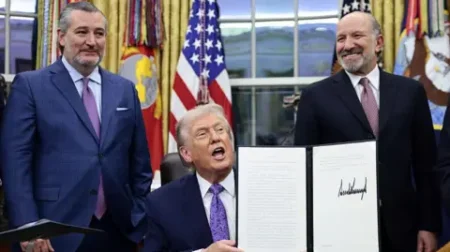In a significant development within U.S. foreign policy, U.S. President Donald Trump has reportedly ordered a pause in offensive cyber operations against Russia. This decision comes in response to ongoing diplomatic efforts aimed at resolving the conflict in Ukraine, which has persisted since Russia’s large-scale invasion three years ago. However, specifics regarding the rationale for this pause have not been disclosed publicly, leading to questions about its implications and duration. The Department of Defense has refrained from elaborating on the matter, further clouding the situation.
The directive is understood to have been issued just before Trump engaged in a contentious exchange with Ukrainian President Volodymyr Zelensky during a televised event at the White House. Since his return to office, Trump has notably softened the U.S. stance towards Moscow, indicating a desire to negotiate an end to the war. This shift represents a stark contrast to the previous administration’s harsh criticism of Russia’s actions in Ukraine. Trump’s approach has raised eyebrows, especially as he has echoed certain justifications provided by Moscow for its military actions, and he recently proposed a meeting with Russian President Vladimir Putin. In a surprising turn of events, the U.S. has even aligned with Russia during critical votes at the United Nations regarding the ongoing war.
Tensions between Trump and Zelensky have intensified, emphasized during their recent Oval Office confrontation. During this meeting, Trump labeled Zelensky a dictator, expressing that the Ukrainian leader is “gambling with World War Three,” thereby framing the conflict in a dire light. This confrontation paints a portrait of a complex, strained relationship at a time when the stakes are incredibly high for both nations involved in the conflict.
The pause in cyber operations, directed by Defense Secretary Pete Hegseth, has prompted serious concerns regarding the United States’ responsiveness to threats posed by Russian hacking, election interference, and sabotage targeting Western countries that support Ukraine. According to reports, the halt could impact hundreds to thousands of personnel involved in operations to bolster Ukraine’s digital defenses. A senior defense official emphasized that operational concerns prevent further comments on the matter but reiterated that ensuring the safety of military personnel in all operations, including those in the cyber domain, remains a top priority for Secretary Hegseth.
Moreover, National Security Adviser Mike Waltz downplayed the notion of a public policy shift, noting in a CNN interview that various strategies—including both incentives and pressures—would be employed to expedite the end of the war. Recent meetings between senior members of Trump’s team and their Russian counterparts—in which Ukrainian representatives were excluded—have triggered defenses of this new diplomatic tactic. Secretary of State Marco Rubio articulated that successful negotiations with Russia necessitate a more conciliatory approach rather than one that is overtly confrontational.
The divergence in approach has led to criticism from some political quarters. Senate Minority Leader Chuck Schumer, representing the Democratic perspective, labeled this pause in cyber operations a “critical strategic mistake,” arguing that it effectively grants Russia a “free pass” to continue its cyber offensives and ransomware attacks against essential American infrastructure. This sentiment underscores the high-stakes game of international relations, where American policy decisions regarding Russia could have profound and far-reaching consequences.
As this evolving situation continues to unfold, the implications of such a policy shift present a variety of challenges and opportunities for the United States, its allies, and the global community at large. The tension between diplomatic engagement and a strong military posture against perceived aggressors remains a complex balancing act for the current administration.










